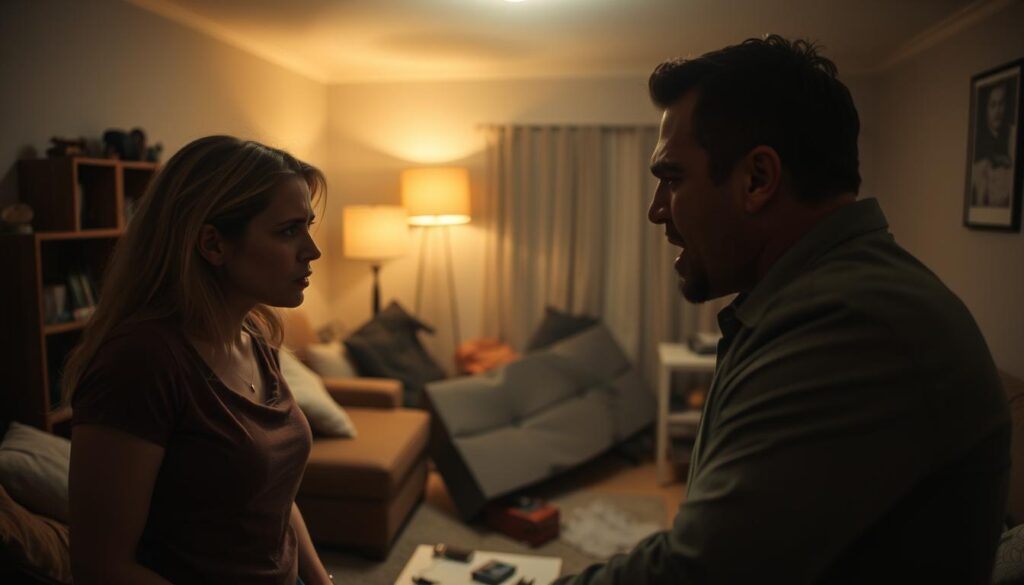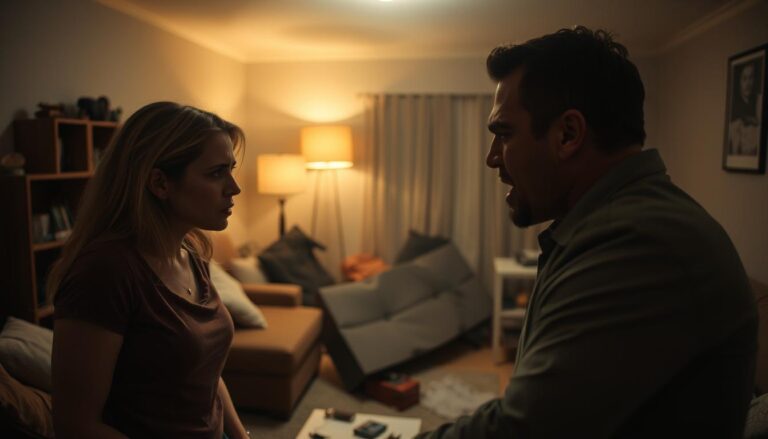Ever felt like your whole world was turned upside down? Domestic dispute charges can do that. They affect people from all backgrounds, causing emotional pain and uncertainty. It’s important to know how serious a domestic violence charge is.
Dealing with these charges can be tough, especially when it affects your job, family, and personal life. It’s not just about the law; it’s about the emotional and social effects that last long after court. Children who see these conflicts are at risk of becoming victims or abusers themselves.
Though the road ahead is hard, knowing your rights and the court process can help. Let’s explore the key points of domestic dispute charges. This will help you understand the challenges and how to move forward.
Table of Contents
Understanding Domestic Violence Charges
Domestic violence charges cover a wide range of behaviors in intimate or living together relationships. These charges go beyond just physical violence. They also include emotional abuse and threats. Knowing what a domestic violence charge is can greatly affect both the accused and the victim.
In Texas, about 45% of domestic violence cases involve spouses. Non-marital cases make up a big part of the statistics. These allegations are complex and need careful attention from everyone involved.
The legal effects of a domestic violence charge are serious. First-time offenders might face a Class A misdemeanor. This can mean up to a year in jail and fines up to $4,000.
Repeat offenders could be charged with a third-degree felony. This can lead to two to ten years in prison and fines up to $10,000. Aggravated domestic assault can be a second-degree felony. This means two to twenty years in prison.
It’s important to understand these legal terms. They show the possible consequences one might face. For example, using a deadly weapon in an assault can lead to a first-degree felony. This carries severe penalties.
Also, a domestic violence conviction can affect your life a lot. It can lead to losing custody of your children and make finding a job hard.
It’s key to know that domestic violence charges can happen even if the victim wants to drop the case. Prosecutors can still choose to pursue charges if they have enough evidence. This shows how complex these allegations can be.
Types of Domestic Violence Charges
Knowing about the different domestic violence charges can help those accused. These charges include physical assault, emotional abuse, and sexual abuse. Each one has its own legal impact, affecting both the accused and the victims.
Physical Assault
Physical assault is a common type of domestic violence. It involves acts that cause harm or threaten to do so. The severity of the charge can vary, from misdemeanors to felonies, based on the injuries.
In Tennessee, domestic assault can lead to jail time and fines. It’s important to understand the legal consequences.
Emotional Abuse
Emotional abuse is often overlooked compared to physical harm. It includes actions like manipulation and verbal attacks that lower a person’s self-worth. Despite not causing physical harm, it can have deep psychological effects.
Legal issues surrounding emotional abuse are complex. It’s vital for those accused to know their rights and options.
Sexual Abuse
Sexual abuse involves forcing or coercing someone into unwanted sexual acts. This charge can result in severe penalties, including long prison sentences. It may also require sex offender registration in some places.
Understanding the impact of a sexual abuse charge is crucial. It can affect many areas of life, including work and personal relationships.

Legal Implications of Domestic Dispute Charges
Being charged with domestic violence has big legal effects on your life. It’s important to understand these issues, especially if you’re facing them. Police often have to arrest someone in domestic disputes, even without physical violence.
Domestic violence cases often lead to protective orders. These orders can limit your contact with the alleged victim and may force you to leave your home. It’s key to know your rights, like the right to a lawyer and being innocent until proven guilty.
The outcomes of domestic violence charges can vary a lot. Charges can be “wobblers,” meaning they can be misdemeanors or felonies. Misdemeanors can lead to up to a year in jail, while felonies can mean two to four years in prison and big fines. A conviction can also mean you can’t own guns and could face deportation.
These charges can also affect your personal life. They can impact your job, where you can live, and custody of your children. This shows how serious these charges are and how they can affect many areas of your life.

Consequences of a Domestic Violence Charge
A domestic violence charge can change your life in many ways. It’s important to know what these changes are. These effects can be both legal and personal, impacting your life in many areas.
Criminal Penalties
In Florida, domestic violence charges come with serious penalties. For a first-time misdemeanor, you could face up to a year in jail and fines of $1,000. First-time offenders usually have to spend at least 10 days in jail.
Felony charges are even more severe. A first-time felony conviction could mean up to five years in prison and fines of $5,000. Probation for misdemeanors can last a year, and you might have to take a 26-week program to learn about battering.
Collateral Consequences
A domestic violence charge can also have long-term effects. It might stop you from getting certain jobs, especially those that involve working with vulnerable people. It could also affect your ability to see your children, as the court’s main concern is the child’s safety.
It’s hard to seal or expunge a domestic violence conviction. This can hurt your chances of getting a job or renting a place. Also, federal law doesn’t let people with domestic violence misdemeanors own guns. This limits your freedom and choices in life.

The Court Process for Domestic Dispute Charges
Understanding the court process after a domestic dispute charge is key. It starts right after someone is arrested. Knowing what to expect can help you deal with the legal side, which can be tough.
Arrest and Initial Charges
After an arrest for a domestic dispute, the person must see a judge within 48 hours. The bail can vary, from $15,000 to just $1,500. To get out, you might need to pay $150.
One condition for release is a “stay away” order from the victim. Breaking this order can lead to big legal problems. You might also have to stay away from drugs and alcohol, especially if they were involved in the incident.
Ankle monitors could be used to track your movements. This is part of the conditions for release.
Court Proceedings
The Colorado court process for domestic violence has many steps. These include getting protection orders, advisement hearings, and arraignment. Then comes the pre-trial conference, trial, and sentencing.
Victims can get help from advocates during these steps. Their testimony is very important in deciding the case’s outcome. If the victim doesn’t testify, the judge can still make a decision based on other evidence.
Having a lawyer and knowing your rights is crucial. It helps you understand and deal with these serious charges.

Defense Strategies for Domestic Dispute Charges
When you face a domestic violence charge, it’s important to have a solid defense plan. Knowing your options can greatly affect the outcome. Here are some common defense strategies that might help reduce or clear your charges.
Self-Defense Claims
Presenting a self-defense claim is a key strategy for domestic violence charges. If you acted to protect yourself from an immediate threat, showing this can be crucial. The law allows self-defense if your actions were necessary to protect yourself in a dangerous situation.
False Allegations
False claims of domestic violence can happen, especially in situations like divorce or custody battles. This defense focuses on proving the accusations were made up or exaggerated. Gathering evidence like text messages or witness statements can be key in fighting these claims.
Lack of Evidence
In domestic violence cases, the prosecution must prove your guilt beyond a reasonable doubt. If they lack solid evidence, like medical reports or consistent witness statements, your case might be dismissed. Highlighting these gaps in evidence can strengthen your defense.
| Defense Strategy | Description |
|---|---|
| Self-Defense | Utilizing action taken to protect oneself from an immediate threat. |
| False Allegations | Claiming the accusations are unfounded or intended to harm your reputation. |
| Lack of Evidence | Challenging the prosecution’s inability to meet the burden of proof. |
Impact of Domestic Dispute Charges on Your Life
Being charged with a domestic dispute can affect many areas of your life. It can make finding a job harder and hurt your reputation. These charges can also change how people see you and make it tough to advance in your career.
Employment and Reputation
A conviction for domestic violence can hurt your job chances a lot. Many jobs, like in healthcare or law enforcement, check your background. About 70% of employers do background checks when hiring.
People with a domestic dispute charge often can’t get jobs right away. This makes finding work even harder. Losing a job because of a conviction can also hurt your money situation. Up to 50% of people lose their jobs after such a conviction.
Child Custody Issues
Child custody becomes a big issue when there’s a domestic dispute charge. Courts usually don’t look kindly on such charges. This can mean losing custody or seeing your kids less often.
This can cause a lot of emotional pain for you and your kids. The court’s main concern is keeping the children safe and happy.
Mitigation Options in Domestic Violence Cases
In many domestic violence cases, there are mitigation options that can help avoid harsh penalties. These options focus on helping people change their behavior rather than punishing them. They allow individuals to work on their issues without going to jail.
Probation Alternatives
Probation is a good choice instead of jail for some domestic violence cases. It lets people stay in their communities and follow court rules. This helps keep families together and supports personal growth, making it easier to get back into society.
Anger Management Programs
Joining anger management programs is another mitigation option. It shows that someone is serious about changing their behavior. Courts often see this as a positive step, which can lead to better outcomes in domestic violence cases.
The Role of a Criminal Defense Attorney
Facing a domestic violence charge can be very scary and overwhelming. A skilled criminal defense attorney is key in helping you through the legal process. They start by collecting important evidence that supports your defense. This might include medical records, witness statements, and other documents that can help clear your name.
Creating a strong defense strategy is also part of their job. Each case is different, but common strategies might include self-defense claims or proving false allegations. With serious consequences like jail time or a permanent criminal record possible, having a good lawyer is crucial.
Your lawyer will fight for your rights in court. They make sure the prosecution proves your guilt beyond doubt. A good lawyer will challenge the evidence and work for a fair trial, giving you the best chance of a good outcome.
The impact of a domestic violence charge should not be taken lightly. It can harm your career, relationships, finances, and reputation. Having a dedicated lawyer who knows the law can help lessen these effects. With the right legal help, you can face this tough situation with more confidence.
Key Evidence in Domestic Violence Cases
In domestic violence cases, the right evidence is crucial. It helps decide the outcome. This evidence is used in criminal cases, divorce, and custody disputes. Knowing what evidence is important is key for those involved.
Physical Evidence
Physical evidence is key in proving domestic violence. It includes:
- Medical records showing injuries
- Photos of injuries
- Messages that show threats or harassment
- Items found at the scene, like fingerprints or blood
Each piece of evidence must be carefully checked. Legal teams need to make sure it’s accurate. Mistakes can change the outcome of a case.
Witness Testimony
Witnesses can give important details about domestic violence. They can support or deny claims. This includes:
- Statements from family, friends, or neighbors
- Opinions from mental health experts
Witnesses can explain the household’s conflicts. It’s important to understand how their stories match the physical evidence. This helps build a strong defense in domestic violence cases.
Understanding Your Rights When Facing Charges
When you face a domestic violence charge, knowing your rights is key. You have the right to stay silent when questioned by police. This can help protect you from saying something that might harm your case.
Having access to a lawyer is also a big right. A skilled attorney can help you with your domestic violence charges. They know the law well and can build a strong defense for you.
It’s important to remember your right to a fair trial. This means you should get fair treatment in court. Knowing your rights helps you make smart choices in your case.
Communication rights are also crucial. You might face a restraining order, which limits contact with the alleged victim. It’s vital to understand this order and follow it while seeking legal help when needed.
To wrap it up, your rights when facing a domestic violence charge include:
- The right to remain silent.
- The right to legal representation.
- The right to a fair trial.
- Understanding communication restrictions imposed by restraining orders.
In conclusion, knowing your rights can greatly affect your case’s outcome. You have the right to protect these rights, which can lead to better results in court. Use the resources available and get professional legal help when you need it.
What to Do After Being Charged with Domestic Violence
Being charged with domestic violence can be scary and overwhelming. It’s important to stay calm. This helps you think clearly and make good choices.
First, find a good lawyer. They know how to handle your case. They will tell you what to do next and help you defend yourself.
Don’t talk to the person who accused you. Talking to them can make things worse. Try to gather evidence that supports your side of the story. This could be photos, messages, or accounts from others.
It’s also important to understand the charges against you. The penalties can be different. For example, misdemeanors might mean up to a year in jail. Felonies could mean more than a year.
Being ready for court is key. Your active participation can help your case. So, prepare well and be ready to speak up.
| Charge Type | Potential Penalty |
|---|---|
| Misdemeanor Domestic Violence | Up to 1 year in jail |
| Felony Domestic Violence | Over 1 year in jail |
| Domestic Violence Violation | Up to 15 days in jail |
Many things can affect your case. Past charges or evidence like recantations can change things. Always talk to your lawyer and follow their advice. This can help a lot in the short and long term.
Common Misconceptions About Domestic Dispute Charges
Understanding domestic violence charges means knowing some common myths. Many think all domestic violence claims are true. But, some claims might come from misunderstandings or bad motives, leading to unfair convictions.
Another myth is that being charged means you’re guilty. But, the law needs solid evidence to prove guilt. Prosecutors must show guilt beyond doubt, making these cases very complex.
Some think victims can easily drop charges. But, once police get involved, the case can go on without the victim’s say-so. This shows how complex the legal process is.
False accusations are a big part of domestic violence cases. These myths hurt the accused and make people misunderstand domestic violence.
Experts help clear up these myths. They teach jurors and judges about the complex nature of domestic violence. Evidence like police reports and medical records can show if the accuser’s story doesn’t add up.
The effects of domestic violence charges go beyond legal trouble. They can hurt your reputation and job chances even before a trial. Knowing these myths helps us understand domestic violence laws better.
Seek Professional Legal Help Early
Facing a domestic violence charge can be overwhelming. Getting professional legal help early is key. It helps you navigate complex situations and ensures evidence is collected quickly.
Statistics show the gravity of domestic violence, with over 9,000 cases in Miami-Dade County in a year. This shows the need for good legal help. Victims who get legal help early are 50% more likely to leave abusive relationships.
It’s important to understand the legal side of a domestic violence charge. Many victims don’t report incidents, with about 60% not involving police. A good lawyer can guide you through the process and help with restraining orders if needed.
Legal help also boosts your chances in custody disputes related to domestic violence. Victims with legal support are 80% more likely to get good results. Don’t face these challenges alone. Professional legal help offers the best support and a clear path forward.
Conclusion
Understanding domestic dispute charges is key. They can deeply affect your life and future. Both misdemeanor and felony charges come with big penalties like jail time and fines.
A conviction can take away your rights, like owning a gun. It can also hurt your job chances because of background checks.
Being charged with domestic violence affects more than just the law. It can change your personal and family life, especially with child custody. Knowing your rights and the long-term effects is crucial, including issues with immigration status and deportation risk.
Getting professional legal help early is vital. An experienced lawyer can help you understand the legal process. They can also fight for your rights as you face the serious effects of a domestic dispute charge. Learning about these charges can help you make better choices for your future.
FAQ
What is considered a domestic violence charge?
What are the types of domestic violence charges I might face?
What legal implications arise from a domestic dispute charge?
What are the potential consequences of a domestic violence charge?
What happens in the court process for domestic dispute charges?
What defense strategies can I use against domestic dispute charges?
How can domestic dispute charges affect my life outside of court?
What are some mitigation options available in domestic violence cases?
Why is hiring a criminal defense attorney important?
What types of evidence are crucial in domestic violence cases?
What rights do I have if I’m facing domestic violence charges?
What should I do immediately after being charged with domestic violence?
What are some common misconceptions about domestic violence charges?
Why should I seek professional legal help early in the process?
There are no reviews yet. Be the first one to write one.

